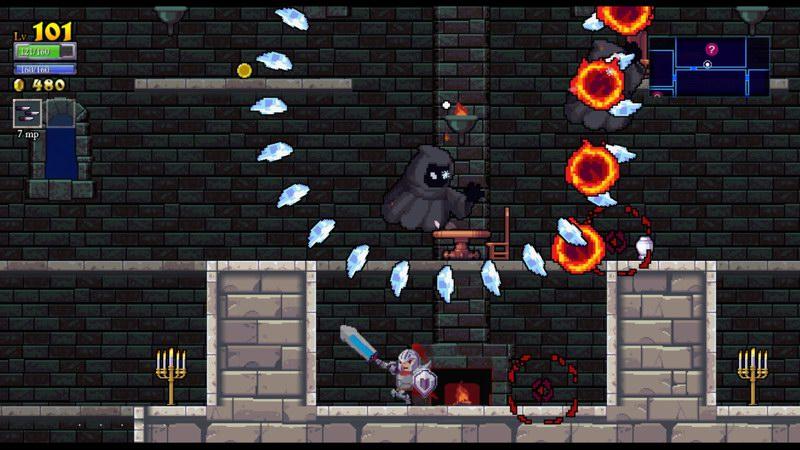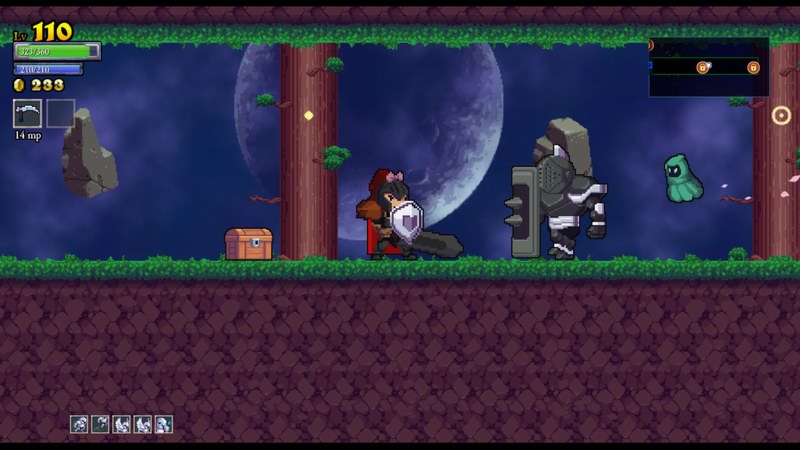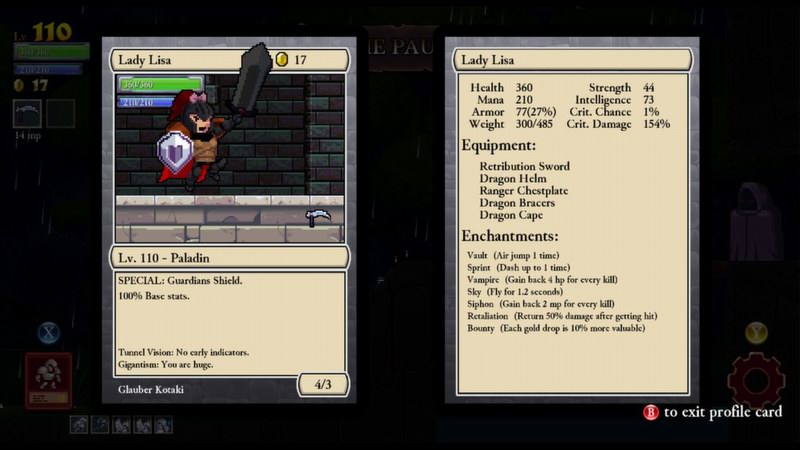Rogue Legacy | reviews, news & interviews
Rogue Legacy
Rogue Legacy
This retro platformer with a twist is a family affair

At first glance, Rogue Legacy looks like a straight retro platformer in the vein of Castlevania or The Lost Vikings. You must negotiate a castle and other environs made up of floating platforms, floor spikes and fireball-spewing traps while collecting loot hidden in chests or inside the smashable furniture while being harried by varied enemies who mostly follow set paths.
Of course, the devil is in the detail and - in this case - the title. Rogue Legacy is a form of "roguelike" - a class of RPG descended from the ancient ASCII game Rogue and noted for being brutally unforgiving. Rogue's single cruellest feature was the concept of permadeath. When you die in a roguelike, there are no save games or time-rewinding powers. You die. Game over. That's it for you. In some variants, a future character might see a pile of bones and rusted armour where you fell but that's your lot.
 Rogue Legacy is more "in the spirit of" roguelike games rather than a full-on member of the family. Where most roguelikes are turn-based and reward careful strategic play, this is an action game to the core and you need quick wits and fast fingers if you are going to use the fancy skill you spent ages grinding to unlock. The sheer complexity and detail of roguelikes like Nethack or Angband is also absent, but that's not to say Rogue Legacy lacks depth. There is a good deal more going on here than in, say, Diablo - perhaps the most widely known (and watered down) of Rogue's descendants.
Rogue Legacy is more "in the spirit of" roguelike games rather than a full-on member of the family. Where most roguelikes are turn-based and reward careful strategic play, this is an action game to the core and you need quick wits and fast fingers if you are going to use the fancy skill you spent ages grinding to unlock. The sheer complexity and detail of roguelikes like Nethack or Angband is also absent, but that's not to say Rogue Legacy lacks depth. There is a good deal more going on here than in, say, Diablo - perhaps the most widely known (and watered down) of Rogue's descendants.
This game's unique twist on permadeath is where the "Legacy" bit comes in. Every time you die (which will be often - the game is harder than a diamond Ross Kemp) your next character will be a descendant of that recently deceased hero. You can choose between three possible heirs every time, and each will have a random selection of abilities and traits which vary from the useful (Gigantism or the automap-boosting Eidetic Memory) to the downright silly (Vertigo, which inverts the screen, or Nostalgic, which gives the game a sepia tone).
This notion of new and unique characters is a bit of a cheat really, as you get to keep any gold that you find and can spend it on upgrading your family home to boost your starting abilities or affect gameplay in various ways. You are in effect playing your entire family tree as a character, it's just that every time you enter the castle you have slightly different stats and perks.
 Gameplay is tough, but the random nature of the obstacles you face and the traits system keeps things fresh enough for you to want to try again and again. Despite its retro looks, a lot of effort has clearly been put into making Rogue Legacy, and the result is a finely-tuned game that finds a sweet spot between frustration and reward. There are lots of pleasing little touches and "Easter eggs" (eg the "Hedgehog's Curse" rune, which will have you spilling coins on contact with an enemy and raise a smile in fans of a certain 16-bit hero), but it is the solid gameplay that will keep you coming back for more.
Gameplay is tough, but the random nature of the obstacles you face and the traits system keeps things fresh enough for you to want to try again and again. Despite its retro looks, a lot of effort has clearly been put into making Rogue Legacy, and the result is a finely-tuned game that finds a sweet spot between frustration and reward. There are lots of pleasing little touches and "Easter eggs" (eg the "Hedgehog's Curse" rune, which will have you spilling coins on contact with an enemy and raise a smile in fans of a certain 16-bit hero), but it is the solid gameplay that will keep you coming back for more.
- Rogue Legacy is out now. Developed and published by Cellar Door Games. Platform: Windows. Mac & Linux coming soon.
- Read other gaming reviews on theartsdesk
- Stuart Houghton on Twitter
The future of Arts Journalism
You can stop theartsdesk.com closing!
We urgently need financing to survive. Our fundraising drive has thus far raised £49,000 but we need to reach £100,000 or we will be forced to close. Please contribute here: https://gofund.me/c3f6033d
And if you can forward this information to anyone who might assist, we’d be grateful.

Subscribe to theartsdesk.com
Thank you for continuing to read our work on theartsdesk.com. For unlimited access to every article in its entirety, including our archive of more than 15,000 pieces, we're asking for £5 per month or £40 per year. We feel it's a very good deal, and hope you do too.
To take a subscription now simply click here.
And if you're looking for that extra gift for a friend or family member, why not treat them to a theartsdesk.com gift subscription?
more Gaming
 'We are bowled over!' Thank you for your messages of love and support
Much-appreciated words of commendation from readers and the cultural community
'We are bowled over!' Thank you for your messages of love and support
Much-appreciated words of commendation from readers and the cultural community
 Kelly Clancy: Playing with Reality - How Games Shape Our World review - how far games go back
The acclaimed neuroscientist on the world and history of games, in all their variety
Kelly Clancy: Playing with Reality - How Games Shape Our World review - how far games go back
The acclaimed neuroscientist on the world and history of games, in all their variety
 Rage 2 review – garish but great post-apocalyptic shooter
Challenge The Authority in this 'Mad Max on mushrooms' renegade romp
Rage 2 review – garish but great post-apocalyptic shooter
Challenge The Authority in this 'Mad Max on mushrooms' renegade romp
 World War Z review - bloodthirsty fun with the zombie apocalypse
Chainsawing the brain-eaters as you battle against the tide of the undead
World War Z review - bloodthirsty fun with the zombie apocalypse
Chainsawing the brain-eaters as you battle against the tide of the undead
 The Lego Movie 2 Videogame review - everything is not awesome
Few fresh ideas means this movie adaptation treads the same old ground
The Lego Movie 2 Videogame review - everything is not awesome
Few fresh ideas means this movie adaptation treads the same old ground
 Anthem review - singing praises? More like a cautious nod
A rocky start for a new franchise that offers potential and problems in equal measure
Anthem review - singing praises? More like a cautious nod
A rocky start for a new franchise that offers potential and problems in equal measure
 Crackdown 3 review - spectacular super-powered action that was great fun many years ago
Nearly a decade has passed since the last incarnation but little has changed in this stagnant shooter
Crackdown 3 review - spectacular super-powered action that was great fun many years ago
Nearly a decade has passed since the last incarnation but little has changed in this stagnant shooter
 Battlefield V review - WWII on an epic scale
The veteran series returns for another ambitious tour of duty
Battlefield V review - WWII on an epic scale
The veteran series returns for another ambitious tour of duty
 Fallout 76 review - how to wreck a perfectly good legacy with one messy game
When home runs go horribly wrong
Fallout 76 review - how to wreck a perfectly good legacy with one messy game
When home runs go horribly wrong
 Red Dead Redemption 2 review - the cowboy drama makes a triumphant return
An ambitious Wild West odyssey that matches epic scale with benchmark skill
Red Dead Redemption 2 review - the cowboy drama makes a triumphant return
An ambitious Wild West odyssey that matches epic scale with benchmark skill
 Call of Duty: Black Ops 4 review – less is more
Solo rations have been relegated from this benchmark war series
Call of Duty: Black Ops 4 review – less is more
Solo rations have been relegated from this benchmark war series
 FIFA 19 review - the best just got a bit better
It looks and plays great, but what’s new?
FIFA 19 review - the best just got a bit better
It looks and plays great, but what’s new?

Add comment